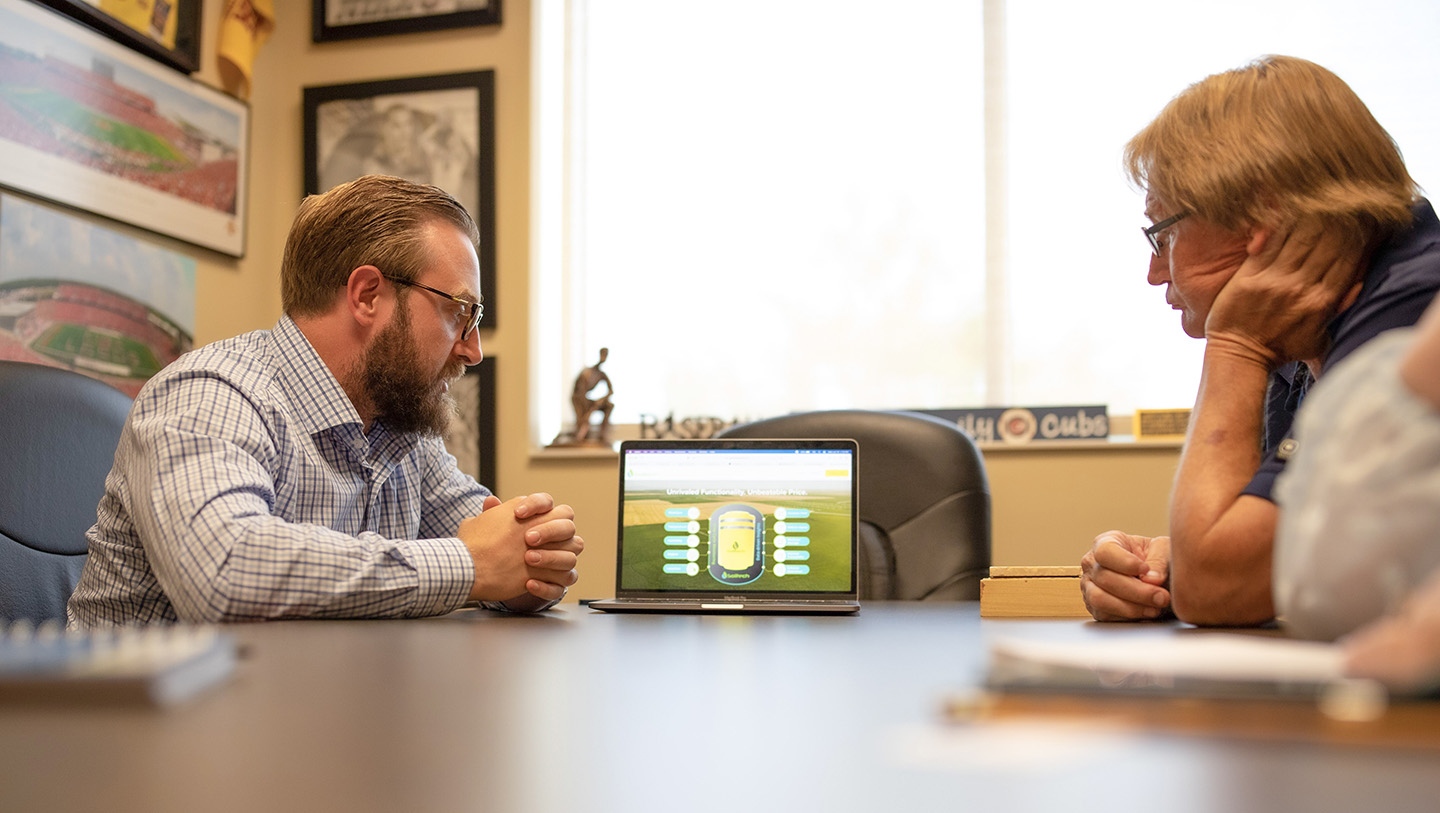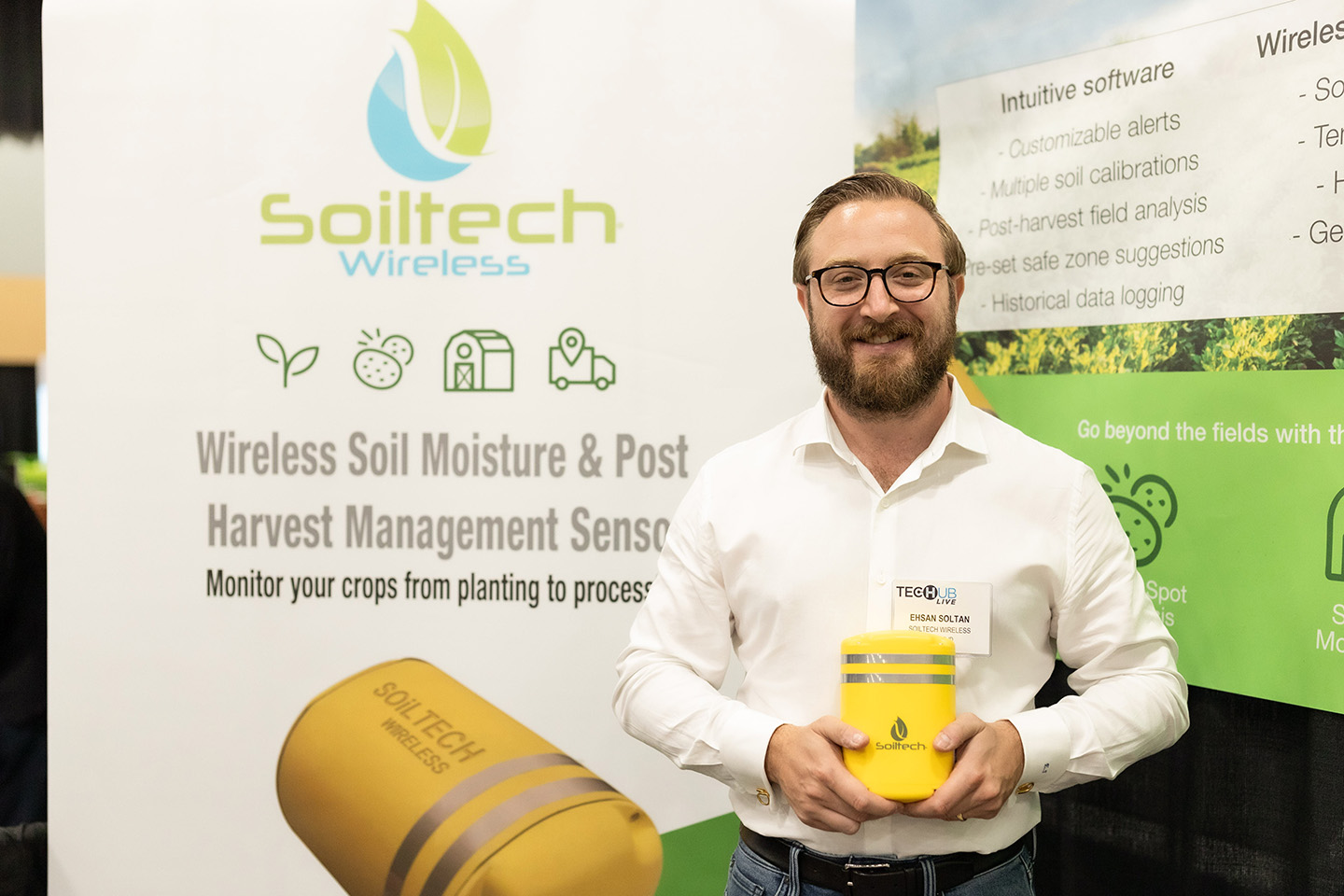
(Photo: Iowa Soybean Association)
Tech Talk
March 15, 2022 | Bethany Baratta
Farmers want solutions to on-farm challenges. But not next season or next year: now. That’s why Meister Media Worldwide, CropLife Media and PrecisionAg teamed up to provide an opportunity for farmers and innovative industry leaders to engage in meaningful, solutions-based discussions during the first-ever Tech Hub LIVE event held in Des Moines.
The event provided sessions and technology geared toward nitrogen management, drone imaging, sustainability, carbon markets and more.
“We’re seeing a unique intersection of agronomy and technology, grounded in what’s going on at the farm gate,” says Paul Schrimpf, chair of Tech Hub LIVE.
Farmers don’t want to wait one season for answers about what’s going on in their fields; they want answers and solutions immediately, he says.
“The ability to make decisions now is central to what we’re seeing develop in the industry. Farmers want to be able to make decisions on the go.”
The following are a few companies who highlighted their technology at the show:
Soiltech Wireless
To help farmers overcome the gaps and challenges in a crop’s production cycle, Ehsan Soltan founded Soiltech Wireless in 2017. Soiltech’s sensor technology equips growers with crucial real-time insights into environmental and soil conditions that may affect the health of crops.
Taking a grassroots approach to innovation, Soltan collaborated with growers, agriculture scientists and industry researchers to make sure the Soiltech sensor effectively addresses real pain points, while being a simple to-use and affordable high-value solution for all farmers.
“Most growers are not integrating technology in their operations as much as they could be,” says Soltan, CEO of Soiltech Wireless. “That’s not their fault; a lot of it is too complex and too expensive.”
Whether you’re growing 50 acres of soybeans of 5,000 acres of soybeans, Soltan believes technology should be accessible and affordable.
Originally conceived on potato farms in Idaho, growers use the Soiltech sensor on over 25 types of crops, including soybeans. From its unique wireless sensor design that travels with a crop from planting to storage, to its expansive cloud platform and services for turning data into actionable insights, Soiltech and its clients continue to uncover new use cases.
Soybean and potato growers share similar values in that they want to produce the best product while capturing the most value, Soltan says.
“There’s more incentive to keep a closer eye on things to ensure that you don’t lose those extra few cents or dollars,” he added.
Whether it’s keeping a closer eye on the growing conditions, tracking product location in transportation or monitoring grain quality in storage, Soiltech Wireless is the pre-configured, pre-charged and farm-ready solution available right out of the box.
“We want to provide farmers with a single solution to monitor everything from soil conditions to storage,” Soltan says.
The ability to monitor crop and soil conditions from their Soiltech app allows growers to avoid unnecessary trips to the field. “Sometimes, farmers invest in the devices for peace of mind,” Soltan added.
Learn more about the Soiltech Wireless at www.soiltechwireless.com.

Ag Leader
In 1986, Ag Leader Technology’s Founder and President Al Myers was testing a prototype yield monitor in his father’s combine in eastern Illinois.
In 1992, the prototyped monitor was developed and ready to hit the market. Yield Monitor 2000 was the first commercially successful on-the-go yield monitor.
Thirty years later, Ames-based Ag Leader continues with that same ag entrepreneurial spirit.
“One of the advantages of Ag Leader is that a lot of those who test and program our products are farmers themselves,” says Russ Morman, marketing representative for Ag Leader. “They come at the product with: ‘I’m a producer, how can I make this easier to use?’ ”
The company’s SureSpeed planting system is a complete high-speed, high-accuracy planting solution at any speed up to 12 mph.
This integrated seed metering and delivery system provides high-performance singulation and the lowest seed delivery point in the industry for optimal seed placement. Accuracy is a priority; speed is a bonus, Morman says.
“We can get to where the seed needs to be with less velocity, so the seed isn’t rolling,” he says. “This allows us to have better soybean seed spacing.”
Ag Leader has also developed a steering platform, speeding up product innovation while providing superior service.
SteerCommand Z2 is a complete system, combining steering with planting, application, harvest controls and more. The system provides repeatable accuracy, with repeatable accuracy correction within 2.5 centimeters, keeping field machinery on the guidance line.
CartAce simplifies grain cart operation. When it’s time to unload, the grain cart engages with the press of a button and automatically steers on a line directly under the combine’s auger. Autosteer takes over steering to assist the operator with accurately unloading on the go.
“Finding skilled laborers familiar with farming can be difficult,” Morman says. “CartAce takes an unskilled operator and makes them a skilled operator.”
For more information on AgLeader, visit www.agleader.com.
Rantizo
Rantizo is taking precision ag to a whole new level.
Iowa-based Rantizo uses drone technology paired with digital ag data from partnering companies to autonomously Fly & Apply prescribed treatments in fields.
“The highest value to farmers is generated from delivering inputs precisely where they’re needed, when they’re needed,” says Ben Etsinger, regional sales manager for Rantizo.
Here’s how it works:
- High resolution field imagery from partner imagery companies identifies problem areas to target.
- Growers work with advisors such as agronomists or agribusinesses to prescribe targeted treatment products and rates.
- Rantizo contractors Fly & Apply with autonomous drones delivering required solutions like pesticides, micronutrients, beneficial insects, or cover crops seeds precisely where needed.
Founded in 2018, Rantizo has been at the forefront of pioneering the agricultural drone applications industry with numerous milestones under their belt. In 2019 they became the first company approved for drone-based agricultural spraying in the state of Iowa, with several other states soon following. In 2020, they were granted approvals for the operation of multiple drones, or swarms, in all 48 contiguous states by the Federal Aviation Administration (FAA). And most recently became the first company approved to operate the highly sought after DJI Agras T30 drone which fully loaded weighs approximately 170 pounds.
“With autonomous drone application, you don’t have the soil compaction, crop damage or overuse that you might see with a traditional in-field application,” Etsinger says.
Drone applications have seen grower adoption for high-value, low-acre specialty crops, such as berries and vineyards. Etsinger says Rantizo has also been leveraged as an ideal solution for site-specific applications in row crops, variable terrain, hard-to-access areas, test plots, field edges or anywhere else precision application methods are needed for soybean growers.
Ag retailers, cooperatives and custom applicators benefit from Rantizo’s drone technology capabilities, Etsinger says. Rantizo offers a turnkey system to these organizations which provides them with a streamlined path to custom drone application services for their grower customers to benefit from.
“Most don’t have an airplane or helicopter, so we become an aerial option to them,” Etsinger says. “We are another tool in their toolbox which can add efficiency to their operations and more cost-effective options to the grower.”
For Rantizo service providers, known as contractors, Rantizo’s system includes not just drone equipment, but everything required to safely and legally operate: training, technical support, flight operations support, and insurance.
Growers can hire a Rantizo contractor in their area by visiting rantizo.com/services.
Learn more about Rantizo at www.rantizo.com.
Deveron
Data collection and insights are the foundation of Deveron’s operational strategy.
Headquartered in Missouri, Deveron started as a drone company but expanded as farmers and customers desired to learn more about their fields.
“Customers see drone images and think it is neat but wonder what the image is actually telling them,” says Scott Jackman, Deveron’s vice president of sales.
With a geographically based, technically trained labor force, Deveron provides soil sampling services, plant tissue sampling, sensor and equipment installation, and customized services to fit the needs of its customers. The company’s technology provides insights, turning data from basic information into useful tools, which help inform farmers’ decision making.
The company has an in-house soil science lab, expediting soil sample results. There’s also software to move soil data. The company’s team of experts can also write fertility recommendations based on the soil sampling results.
Deveron doesn’t sell inputs or crop protection services, fertilizers or seeds. “We don’t sell inputs, and we don’t own land,” Jackman says. “We operate in the middle with the data.”
However, the company monetizes the data for the customer by turning it into an ROI.
For example, if an agronomist writes a recommendation for fungicide, Deveron can help the farmer understand the projected return for following the script or the impact for not following the advice.
Deveron has grown from a drone imagery company to one that provides data collection for all aspects of precision ag. The company has worked with Peter Kyveryga, senior research scientist for analytics for the Iowa Soybean Association, to ensure correct digital imagery calibration.
This calibration helps provide a clearer picture of the data, which Deveron provides through each of its services, Jackman says.
“We have a core and fundamental philosophy that every field has variability,” Jackman says. “We work with people who value data and value data-driven decisions. If you believe that every field has variability, then you must figure out to what level variability there is and use site-specific farming to make or save money.”
For more information on Deveron, visit www.deveron.com.
Back